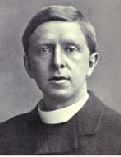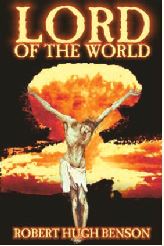 Robert Hugh Benson Robert Hugh Benson |
“Lord of the World” is a 1907 apocalyptic novel by Robert Hugh Benson (1871-1914), an English Anglican priest who joined the Roman Catholic Church (1903) in which he was ordained a priest in 1904. In this novel, Benson depicts a world in which Marxism and secularism have run the table, culminating in a charismatic “savior” figure, increasingly recognizable as the Anti-Christ, who arises to lead a one-world government. Attacks on Christian symbols and believers mount, and euthanasia is widely practiced.
During the airplane news conference on his way back from the Philippines to Rome last January, Pope Francis said about this book, “I advise you to read it”, explaining that it would help people to understand why he talked (in a meeting with families in Manila on January 16) about “forms of ideological colonization which are out to destroy the family” and “the family (that) is also threatened by growing efforts on the part of some to redefine the very institution of marriage, by relativism, by the culture of the ephemeral, by a lack of openness to life.” In other words, the Holy Father seems to imply that the attacks families and the Church are facing now are reminiscent of the kind of world mentioned in Benson’s book, with the final persecution of he Church and the rise of a world dictator. Here is what Catholic commentator Michael Brown (www.spiritdaily.com) wrote about this, giving at the same time an excellent summary of the novel:
by Michael Brown
A commentator recently commented that the Pope's strong public endorsement of a prophetic novel called Lord of the World might explain why he seems to be in a rush to do and change and reform so many things.
We don't think that's necessarily true. He's just that type: he doesn't mince words. He cuts to the chase (whether reforming bureaucracies or giving press conferences; no prolix Pontificate, this!).
We do think, however, after reading this novel, that his endorsement of the book (he referred to it as a "prophecy") means he has a more conservative and a more apocalyptic view of the world's future than many and perhaps the majority of cardinals, bishops, and priests (and certainly more than many members of his own Jesuit order, grounded as they are in a more intellectual/philosophical/ approach) do. For the theme of the book is a warning that one day a Napoleonic, Caesar-like ruler—an anti-christ—could assume presidency of a unified Europe and, from there, leadership of the world. Moreover, the novel ties it all to something else conservatives often fret about: a heavy Masonic-like influence on future events. It's not a book many of us conservatives would have expected the Holy Father to promote.
But promote it he has—most recently on the flight back from Manila. "Reading it," he intoned, "You'll understand what I mean by ideological colonization"—a term he has used to describe the forcible attempt by government to impose such things as gay marriage and redefining "family." In 2013, the Holy Father also had mentioned the book, saying it depicted "the spirit of the world which leads to apostasy almost as if it were a prophecy."
In other words: the Holy Father's constant warnings on worldliness (especially to priests and bishops) apparently go toward a fear that it will lead us to the end times and an evil ruler who usurps and assumes religious power in the midst of profound general apostasy. That's a mouthful of precognition!
 Perhaps a few excerpts are in order.
Perhaps a few excerpts are in order.
“Mr. Templeton inhaled another long breath from his instrument,” says the novel, written by a priest named Monsignor Robert Hugh Benson in 1907. “Then again he took up his discourse. ‘Briefly,’ he said, ‘'there are three forces—Catholicism, Humanitarianism, and the Eastern religions. About the third I cannot prophesy, though I think the Sufis will be victorious.’ In the West, the battle would more be between Catholicism and Humanitarianism, the priest prophesied—correctly.” ‘'You must remember that Humanitarianism, contrary to all persons’ expectations, is becoming an actual religion itself, though anti-supernatural,’ [says Templeton].
“Now, we Catholics, remember, are losing; we have lost steadily for more than fifty years. I suppose that we have, nominally, about one-fortieth of America now—and that is the result of the Catholic movement in the early twenties. In France and Spain, we are nowhere; in Germany, we are less.”
That was stated a hundred years ago! Psychology, it warned, would supplant the supernatural—including among Catholics.
So would materialism. Certainly, we have borne witness to this. But that's just for starters.
Taking its cues from the French Revolution, when churches were desecrated, the novel foresees a time when the secular powers seize the great cathedrals and use them for their own purposes (as also occurred in Soviet Russia). The antichrist institutes worship of a nude female statue at St. Paul's Cathedral as happened in 1793 when the Goddess of Reason was revered inside Notre Dame Cathedral.
“In these searching days none but the humble and the pure could stand the test for long,” the novel warns, “unless indeed they were protected by a miracle of ignorance. The alliance of Psychology and Materialism did indeed seem, looked at from one angle, to account for everything.”
The great talk among priests, in the novel, is “the extraordinary spread of Freemasonry” (or at least its precepts).
The Pope may be viewed as “liberal” on some issues, but not when it comes to prophecy.
Clearly, he believes forces of the world will try to quash Catholicism with an “ideological colonization” that in the book takes the form of widespread mandatory euthanasia.
“Mabel drew a long breath,” says one passage, “and stood looking out across the heat haze that was beginning to rise from the town beneath. To her imagination Europe lay like a busy hive, moving to and fro in the sunshine. She saw the blue distance of France, the towns of Germany, the Alps, and beyond them the Pyrenees and sun-baked Spain; and all were intent on the same business: to capture this astonishing figure that had risen over the world.
“Sober England, too, was alight with zeal. Each country desired nothing better than that this man should rule over them.”
The “man”—the one-world leader, the lord of the world—is one Julian Felsenburgh of Vermont, a senator who appeared as a lone and dramatic figure promising world peace in return for blind obedience.
The fascination with him knows no end. Under his rule, war is abolished. He is exalted like Caesar and crushed his opposition—including the Church—like Napoleon. While at first it is a united Europe that he controls, soon he wins over the world by popular (and inexplicable) acclaim.
Meanwhile, most bishops and priests defect to him as the Pope is reduced to a leader of a Hong Kong-style enclave. The Pope summons the cardinals to Rome, and in retaliation, Felsenburgh orders the destruction of Rome—and kills “Pope John and all the cardinals but the three who were elsewhere.”
Only Ireland remains Catholic (outside of Rome). As a final act, all remaining signs of faith are destroyed.
The last Pope flees to the Holy Land and the location of the apocalyptic battle foretold by Scripture.
For this U.S. politician—at age "thirty-two or three"— is “the supreme force in the world.” A Council of Nations. A seat in Europa. A Convention of the Powers. Apostasy. Socialism. Rituals based on Masonry (if technically not Masonry itself). A return of statues like that of ancient pagan idols. Sole refuge: the Blessed Sacrament. Exalted now is the Idea of Man, without Christianity.
For the sick and disabled and elderly: euthanasia is dictated. Chilling stuff.
Alarms ring. This was in 1907—before Fatima.
“Oh! the news, gentlemen," says another character in the novel. “Well, it was two hundred cars going to Rome. There is a Catholic plot, sir, discovered in London--'”
“'Well?”
“'To wipe out the Abbey. So they're going—”
“'Ah!”
“Yes, sir—to wipe out Rome.'”
Julian Felsenburgh...
Arising, as if from nowhere.
So quickly.
“He came deliberately up the red carpet, superbly alone, rising a step or two at the entrance of the choir, passing on and up before her. He was in his English judicial dress of scarlet and black, but she scarcely noticed it. For her, too, no one else existed but, He; this vast assemblage was gone, poised and transfigured in one vibrating atmosphere of immense human emotion. There was no one, anywhere, but Julian Felsenburgh. Peace and light burned like a glory about him."
The world had leapt forward. Social science was supreme. Don't you see that—non-supernatural spirituality—even among Catholics? The Pope, hidden.
An angel of light.
“To sum up,” wrote Benson, “the Catholic world knew that their Pope lived under the name of Silvester; and thirteen persons of the entire human race knew that Franklin had been his name, and that the Throne of Peter rested for a time in Nazareth.”
Prophecy!
This the novel that Pope Francis recommends—as a warning. A final attack occurs just as the last of the faithful, having taken vows to die in the name of faith, are singing the Tantum Ergo.
The last words of the novel: “Then the world passed, and the glory of it.”
Michael Brown
spiritdaily.com